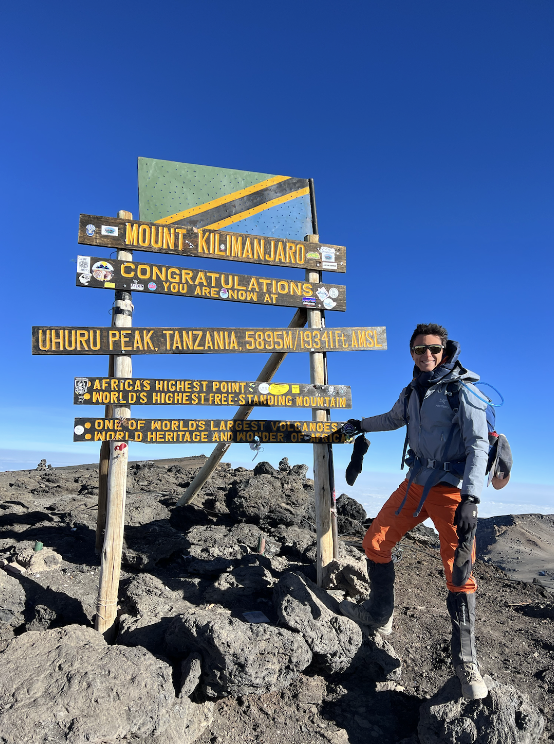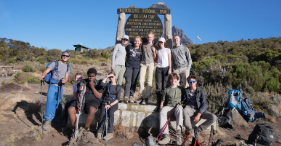This past July, as Mack Haymond ’25 hiked to the top of Mount Kilimanjaro, the highest point in Africa, he recited “poli poli,”- “slow slow” in Swahili.
“It’s the idea to take things step by step and you’re going to
get to where you need to be,” Haymond said.
This summer, he went on a three week service trip with a teen-exploring company, Overland. He joined 11 teens from around the world to explore Tanzania, volunteer at a children’s center, participate in a walking safari and end the journey by taking on the six day Mount Kilimanjaro climb. Culture and perspective would be the prominent insights Haymond took from his summer experiences.
“After coming home from the trip, living my life now, I don’t try to rush everything,” Haymond said. “This mindset has helped to alleviate a lot of stress from my life because I just know, if I just go “poli, poli”, I’m gonna get there.”
Even though Haymond found the mountain’s elevation to be intimidating, ultimately, this proved to be the most rewarding aspect of the hike. The higher you go up, the harder it is to breathe. Haymond said that taking it slow and having controlled breathing helps make the hike more manageable.
“If I can get to the top of Africa, then I can do anything that I have to do in school,” Haymond said, “because when I was up there, I remember thinking I made it. I made it where few people have been, so now I can do anything.”
Typically, everyone who climbs the mountain goes with a climbing company. In addition to the group being led by six guides, there were 40 porters, all Tanzanians, who
carried necessary camping supplies to every camp site up the mountain. They’re so important to the culture, Haymond explained, that if you choose to forgo their engagement in the trip, some climbing companies will charge you a fee.
Haymond said some of the most memorable interactions he shared with the locals were with the head guide, Tony Blaire, a 20 year veteran of Kilimanjaro. While reciting “poli poli”, he encouraged Haymond’s group up the final summit push, a roughly eight hour hike to the top of the mountain.
“There were five other head guides, but Tony Blair, he made it happen,” Haymond said. “He was constantly there for us and made all of us feel like we could do it. The insights that he had about the climb and his history with climbing were fantastic.”
There were other experiences through the course of the trip that demonstrated the importance of culture and respect. For example, during a lesson from Mama Elda at the Living Water Children’s Center, Haymond learned that Tanzanian culture places a strong emphasis on greetings.
“In the lesson, we learned many different
ways to say hello to everybody,” Haymond said. “It doesn’t matter who you’re talking to, or what the situation is, you’re expected to greet them. It was amazing how much their culture is focused on people talking and being together.”
Haymond described that in many Tanzanian cultures, everything moves slower. He described an experience with Mama Elda, who also taught the group Swahili for two days.
“The whole idea is that everything is on ‘Africa time’,” Haymond said. “For instance, on the first full day [of the trip], our teacher (Mama Elda) arrived an hour and a half late because she had something to do. But when she was there, she gave us her full attention. It’s more about going with the flow, something we could adapt to more in Western culture, to live the moment with each other.”
Haymond is not settling for this experience and climb, but rather, is focused on future experiences as he tackles new heights.
“I’m going to climb a smaller mountain in either Washington State or Mont Blanc in Switzerland. After that, I’ll consider Denali, and then eventually work my way towards Everest.”




















































